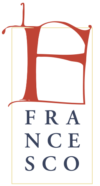The inspiration of the origins
Bible, theology, and philosophy
This section shows us how, in the Franciscan Order, a systematic philosophical-theological reflection immediately developed, representing the “trunk” of the tree of knowledge, sprouted from the “roots” of the Canticle’s intuition. Franciscan authors, passionately studying the Bible and ancient philosophical works, developed a comprehensive vision of the meaning of creation and the role of man in the universe, significantly contributing to the philosophical speculation and science of their time.
The Book of Scripture: the Bible
At the center of the section, we find the “Book of Scripture,” God’s supreme gift, the primary source of all Christian knowledge, and a guide to understanding the mechanisms of creation; alongside it, the other great divine gift, which man can carefully investigate: the “Book of Nature.”
In one of the fifteen volumes of a 13th-century Bible, a splendid miniature of the creation of the world from nothing fully expresses the Franciscan vision: the light of God’s wisdom and intelligence is the creative force of the universe.
At the school of Aristotle
Among the treasures on display are two splendid manuscripts containing works by Aristotle, an author who in the Middle Ages was a reference “authority” with his numerous treatises on philosophy, physics, psychology, biology, ethics, politics, and logic. The friars drew extensively from them, although they mitigated some theses considered “insidious,” such as that on the eternity of the world.
The Franciscans in comparison with the classics
Ancient philosophical texts, particularly those of Greek origin, which arrived in the West through Arab mediation, enriched the Franciscan philosophical-theological production. The numerous annotations present in the manuscripts speak of a careful reading of the sources and a process of understanding matured through the production of comments and original considerations: testimony to the modernity and multiplicity of the friars’ interests, ranging from ethics to the faculties of the soul – today’s psychology –, from law to politics, from economics to science.

